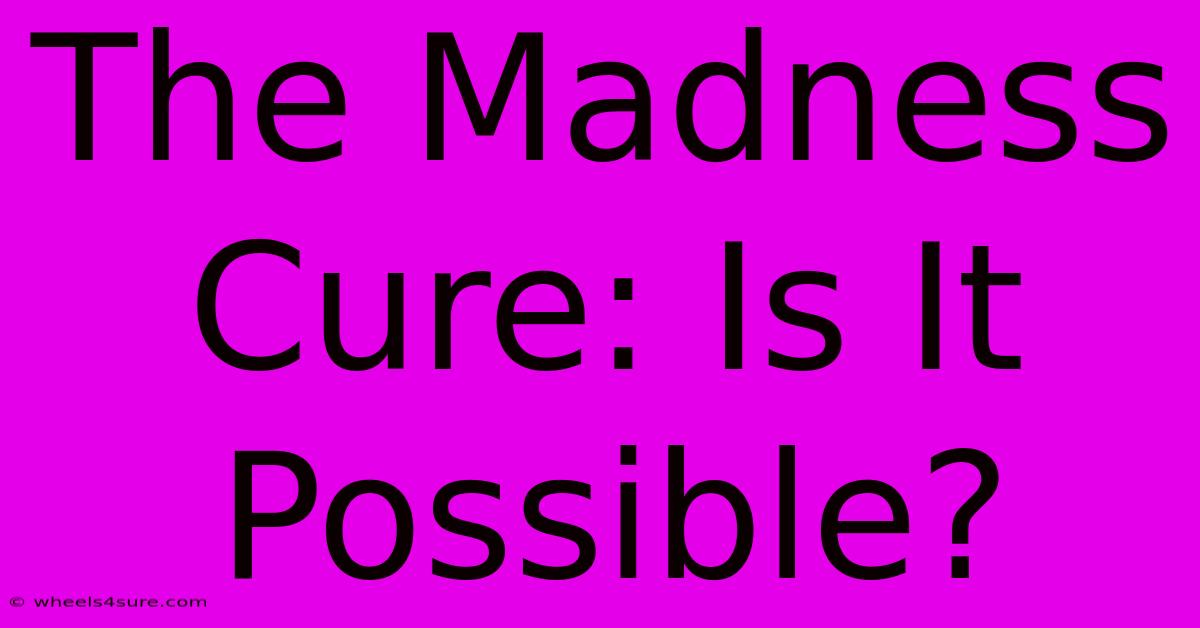The Madness Cure: Is It Possible?

Table of Contents
The Madness Cure: Is It Possible?
For centuries, humanity has grappled with mental illness, searching for a definitive "cure." The term "madness," while outdated and stigmatizing, encapsulates the historical struggle to understand and treat severe mental health conditions. While a single, universal cure remains elusive, significant advancements have revolutionized our understanding and treatment of mental illness. This article explores the complexities of this question, examining the progress made and the ongoing challenges in the pursuit of effective mental health care.
Understanding the Complexity of Mental Illness
The term "madness" encompasses a vast spectrum of conditions, each with unique causes, symptoms, and treatment approaches. From depression and anxiety to schizophrenia and bipolar disorder, these illnesses affect the brain's intricate network, impacting thoughts, feelings, and behaviors. There is no single cause; rather, a complex interplay of genetic predisposition, environmental factors, and life experiences often contributes to the development of mental illness.
The Myth of a Single "Cure"
The idea of a single, all-encompassing "cure" for mental illness is a misconception. Unlike a bacterial infection that can be eradicated with antibiotics, mental illnesses are multifaceted and often chronic conditions that require ongoing management. However, effective treatments exist that can significantly alleviate symptoms, improve quality of life, and enable individuals to lead fulfilling lives.
Advancements in Treatment and Management
The landscape of mental health treatment has undergone a dramatic transformation. Modern approaches emphasize a holistic perspective, combining various therapies and interventions tailored to individual needs.
Medication: A Powerful Tool
Psychotropic medications have revolutionized the treatment of many mental illnesses. Antidepressants, antipsychotics, mood stabilizers, and anxiolytics can effectively manage symptoms and prevent relapses. However, it's crucial to remember that medication is not a standalone solution and often works best in conjunction with other therapies.
Psychotherapy: Unlocking Inner Potential
Psychotherapy, or talk therapy, plays a vital role in addressing the underlying causes and contributing factors to mental illness. Different therapeutic approaches, such as cognitive behavioral therapy (CBT), dialectical behavior therapy (DBT), and psychodynamic therapy, provide individuals with tools and strategies to manage their symptoms, cope with challenging situations, and develop healthier coping mechanisms.
Lifestyle Interventions: The Unsung Heroes
Lifestyle factors significantly impact mental well-being. Regular exercise, a balanced diet, sufficient sleep, and stress management techniques like mindfulness and meditation can complement professional treatment, enhancing its effectiveness and promoting overall mental health.
The Ongoing Challenges
Despite significant progress, substantial challenges remain in the pursuit of better mental health care.
Stigma and Discrimination
The stigma surrounding mental illness remains a major obstacle. Fear, misunderstanding, and prejudice prevent many individuals from seeking help, delaying or hindering their recovery. Education and awareness campaigns are crucial to combat this stigma and create a more supportive and inclusive society.
Access to Care
Access to quality mental healthcare varies widely depending on geographic location, socioeconomic status, and insurance coverage. Many individuals, particularly in underserved communities, face significant barriers to accessing necessary treatment and support services.
Research and Innovation
Continued research is crucial to improve our understanding of the underlying mechanisms of mental illness, develop more effective treatments, and identify potential preventative measures. Investment in research and development is essential to advance the field and ultimately improve the lives of those affected.
Conclusion: Hope and Continued Progress
While the concept of a single "madness cure" is unrealistic, significant progress has been made in understanding and treating mental illness. A multifaceted approach incorporating medication, psychotherapy, lifestyle interventions, and ongoing research offers hope for individuals struggling with these conditions. By continuing to address the challenges of stigma, access to care, and ongoing research, we can move closer to a future where everyone has the opportunity to achieve optimal mental well-being.

Thank you for visiting our website wich cover about The Madness Cure: Is It Possible?. We hope the information provided has been useful to you. Feel free to contact us if you have any questions or need further assistance. See you next time and dont miss to bookmark.
Featured Posts
-
Experience Unparalleled Power Age Of Mythology Hile
Apr 06, 2025
-
Duterte Age The Medias Role
Apr 06, 2025
-
Lamelo Balls Net Worth More Than Just Basketball
Apr 06, 2025
-
Unveiling The Mystery Waseem Akhtars Son
Apr 06, 2025
-
Understanding Your Remaining Balance A Step By Step Guide
Apr 06, 2025
